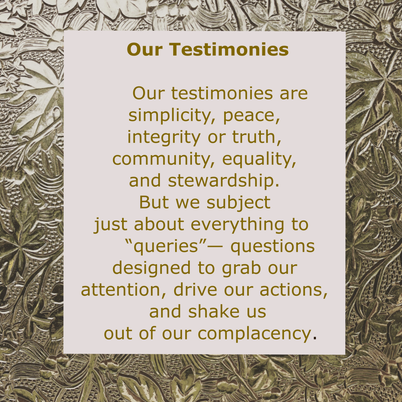Introduction
A testimony is the shared expression of belief and action characteristic of Friends. New testimonies emerge over time to meet new revelations (currently, for example, on sustainability and ecology). Presently, the major testimonies are on Integrity, Equality, Community, Simplicity, Peace, and Sustainability/Ecology, explored below.
Truth and integrity:
From the beginning Quakers believed that each person should search for truth in every aspect of life. Truth can be found by looking inward to the Light that is within all people. We must be true to our innermost sense of spiritual harmony. Integrity calls for authenticity in all our interactions with others. Integrity means upholding the truth in all our dealings.
Equality and community:
The Quaker testimony to equality stems from the conviction that all people are of equal spiritual worth. This was reflected in the early days of Quakerism by the equal spiritual authority of women, by the recognition of the equality of all races, and by the refusal to use titles that recognised social distinctions. Being a part of the Society of Friends means a commitment to attend Meeting, to sit in silence with friends, to take part in other activities and support members of the community. The Meeting has no clergy nor any formal hierarchy. Each person is equal and has the responsibility to be active members in the Meeting.

Simplicity:
The testimony to simplicity was fundamental to the origin of the Society of Friends, as the founders sought to reclaim the simplicity of worship practiced by the early Christians. It is also integral to the Quaker way: our spiritual responsiveness depends on being as free as possible from dependence on material security. Quakers therefore seek to resist the temptation to define their place in society by acquiring possessions.
Peace:
The peace testimony is probably the best-known testimony, both within and outside the Religious Society of Friends. It derives from our conviction that love and interdependent equality are at the heart of existence. Again, there is no set wording, but Friends are deeply attached to the Declaration made to Charles II in 1660, which begins: “We utterly deny all outward wars and strife and fighting with outward weapons, for any end or under any pretence whatsoever.” It has been the Quaker experience over the centuries “to live in the life and power which takes away the occasion of all wars”.
Sustainability:
Quakers have a developing concern for our stewardship of the environment. For many Quakers what has been an “emerging” testimony to ecology has now become an established one, which is strongly related to, and consistent with, the testimonies of peace and simplicity.
Living our Testimonies
Quakers recognise that their testimonies go against many of the current strands of economic, social and political change. This may, therefore, mean dissenting from fundamental aspects of the contemporary social order. It means living out our testimonies so as to hold up an alternative vision of deep human fulfillment. One way of doing so is to share with one another our practice of living our testimonies in accordance with our beliefs much more openly and adventurously, in a spirit of faithful discipleship.